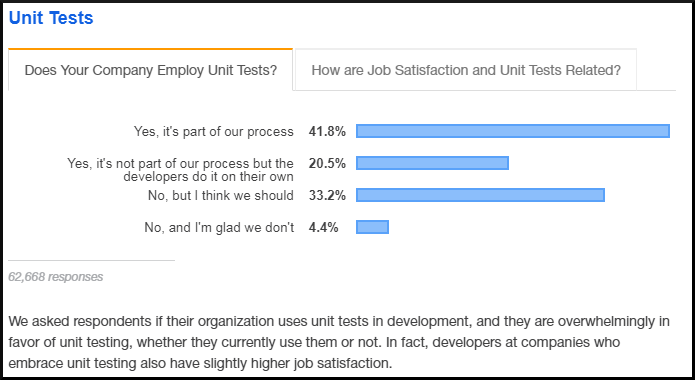I don't think you can state what you do about the data.
As the saying goes: there are little lies, there are big lies, and there are statistics.
You have identified one issue, but there are quite a few if you look closely. Let's be real, though, the SO Survey is not really an attempt to be scientifically rigorous. It's more of a fun little thing that's meant to be mildly interesting, and they're not submitting this for peer review or trying to make grandiose claims based on their minor conclusions.
Nonetheless, there are some things I didn't find tenable.
There are claims in the summary which are obviously unsupported or flat-out contradicted by the data (not counting the one you mentioned):
- About 65% of professional developers on Stack Overflow contribute to open source projects once a year or more. (In fact, 64.4% contribute to open source less than once a year or never.)
- When asked what they primarily believe about blockchain technology, respondents on our survey are largely optimistic about its broad usefulness. (In fact, only 29.2% of respondents said anything about broad usefulness, although 67.6% thought it was useful somehow.)
- When it comes to their own perceptions of engineering management as a career, half of respondents don't think they necessarily need to move to people management to continue to grow their salary. (actually 70.9%, although there is some ground for an argument about how to interpret "Not sure")
There are claims which may be untrue depending on additional information:
- Many developers work on code outside of work. About 80% of our respondents say that they code as a hobby. (Could be misleading - how many of those 80% don't code for work? It's 4%, so here it's fine.)
- Over half of the respondents on our survey have taken a new job within the past two years; frequent job changes are the norm for software developers. (No mention is made of attempting to filter out internships or people who entered the field, despite the fact that 20% of respondents have been in the field fewer than 5 years.)
There are claims which are blown out of proportion or could mislead:
- "As we've found in previous years, developers tend to be more satisfied with their career than with their current job" (The charts are on different scales, which makes direct visual comparison prone to exaggerate the difference that is highlighted. Just look at the middle line and switch back-and-forth a bit. Then look at the numbers.)
- "Developers who belong to gender minorities in tech rank the office environment and company culture as their highest concern when assessing a new job" (52% vs 48% is less than a 10% difference. In contrast, there are huge (200%) disparities in the importance placed on diversity)
- Greatest Challenges to Productivity section. (Once again, the differences highlighted are minor. I get that they have to say something, but there's not really much to say about the gender comparisons here, but they do anyway.)
There could be more, but I don't have time to keep reading it so closely.
